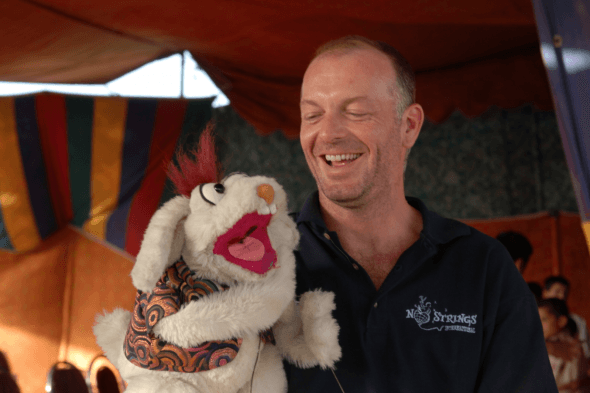Patron Hugo Speer launches Afghan Cinema Bikes

No Strings patron Hugo Speer test drives the eRanger cinema bike as the first two arrive in Kabul. The sidecar contains a large screen, projector and generator
During a chance conversation in his local pub near Harrogate, Yorkshire-born actor and No Strings patron Hugo Speer saw great potential for a motorbike with a cinema sidecar. It’s a conversation that went on to impact thousands of lives in Afghanistan.
Hugo, about to travel to Kabul with No Strings to raise awareness about our landmine programme, realised that what his village neighbour was describing might be the perfect means of screening ChucheQhalin.
The eRanger cinema bike is a tough agricultural scrambler, with a sidecar unit which contains a generator, projector, and a cinema screen big enough to be seen by large groups of people.
Weeks later, in July 2008, Hugo found himself driving through the extraordinary mayhem of Kabul’s daily traffic on one of the first bikes to arrive, with a total of six, along with two ambulance units, now being run by No Strings’ Afghan partner OMAR (the Organisation for Mine Clearance and Afghan Rehabilitation).
ChucheQhalin, the Little Carpet Boy, is No Strings’ first project. Designed to entertain its young Afghan audience in the same way The Muppet Show did children in the West, the 30-minute film also carries crucial life-saving lessons about landmine safety awareness.
Despite the continuing insecurity in Afghanistan, OMAR is expanding its outreach programme, and thanks to their work, hundreds of thousands of Afghan children have been able to watch ChucheQhalin.
Hugo became active in overseas aid work after starring in an episode of Men Behaving Badly with his now close friend Neil Morrissey. A week after filming, he travelled with Neil to Kosovo during the crisis of 1998. Their task was to help support a temporary bakery and feed nearly a million refugees. Overseeing their work was Johnie McGlade, then emergency coordinator for War Child. Johnie went on to found No Strings, bringing both Neil and Hugo on as patrons.
“Neil and I have done a lot of travelling with Johnie,” Hugo says. “Whenever we were in the field with him he would give us this tatty old rabbit puppet to take around the feeding camps and children’s projects. Over the years the three of us have been to Ethiopia, Rwanda, Guatemala, Kosovo and elsewhere, sharing hot, rotting tents and occasionally going to sleep to the crackle of gunfire.
“But the puppet was an incredibly useful thing to have, as it would always make children smile. It also allowed Johnie to tell whole groups of people, young and old, what they needed to know in displacement camps and feeding centres, traumatised people who mightn’t feel ready to listen to Johnie and colleagues, but who were fascinated by Seamus.
“Children flock round puppets in droves. It’s like a universal fact. So when Johnie had the idea to set up a new organisation based purely on getting out life-saving messages through the use of puppets, we were right there with him, and have been ever since.”
The No Strings Afghan programme teaches children where they shouldn’t walk or play, how to spot typical danger signs, and what to do if they find themselves in one of the countless thousands of minefields.
“I actually had to drive one of the bikes up to this steep hillside village perched over Kabul, where this incredibly hospitable headman had arranged for 200 children to turn up and watch the inaugural screening of ChucheQhalin. They were goggle eyed.
“Kabul is very arid and dusty with so much in a state of disrepair. People in so many countries are desperate for stability and a normal life, so they can plan a future. You just listen. You ask questions and do everything you can.
“I love travelling, especially when you feel you can be useful in whatever small way. There are so many people out there who are hell-bent on destruction, there’s a lot of suffering, and it all feels beyond your control, but you can do little things. It’s probably all most of us can ever do.”





